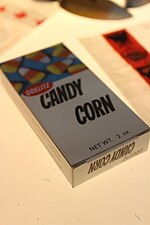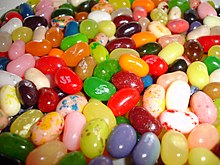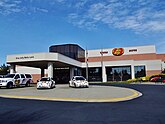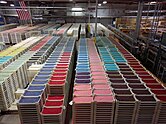 | |
| Formerly |
|
|---|---|
| Company type | Subsidiary of Ferrara Candy Company |
| Industry | Confections |
| Founded | 1869; 155 years ago (1869) in Belleville, Illinois, U.S. |
| Founder | Gustav Goelitz |
| Headquarters | Fairfield, California |
| Area served | Worldwide |
| Key people | Herman G Rowland Sr., Chairman |
| Products | Jelly beans, candy corn, mellocremes, gummies, jells, chocolate confections |
| Revenue | $190 million |
| Number of employees | 800 |
| Website | jellybelly |
Jelly Belly Candy Company, formerly known as Herman Goelitz Candy Company and Goelitz Confectionery Company, is an American company that manufactures Jelly Belly jelly beans and other candy.
The company is based in Fairfield, California, with a second manufacturing facility in North Chicago, Illinois. A distribution and visitor center in Pleasant Prairie, Wisconsin closed in 2020. In October 2008, the company opened a 50,000 sq ft (4,645 m) manufacturing plant in Rayong, Thailand, where it produces confections for the international market. In October 2023, the Ferrara Candy Company announced an agreement to acquire Jelly Belly Candy Company.
History
1866–1913

Gustav Goelitz came to the United States in 1866 from Germany and in 1869 started the confectionery business Gustav Goelitz in Belleville, Illinois. His younger brothers, Albert and George, emigrated to America soon after joining him in the business. In 1898, the company began manufacturing mellowcreme candies (also called mellow cream or butter cream). Candy corn, a type of mellowcreme candy, was likely developed by George Renniger, an employee of Wunderle's Candy Company in Philadelphia. The Goelitz Confectionery Company was successful in selling a variety of mellowcreme candy including candy corn. In 1900 the company opened a factory in Cincinnati and in 1904 the company opened another factory in Chicago. Eventually, the company relocated to North Chicago in 1913.
1913–1980
Herman Goelitz, the son of Gustav, moved to the West Coast to start his own business, Herman Goelitz Candy Company. The company eventually settled in Oakland, California in 1924. In the 1960s, the company began to expand the product line to include jelly beans, various jells, and other confections. "One of those new products was a small and very flavorful Mini Jelly Bean ." The Mini Jelly Bean had natural flavoring added to the center and the outer shell was flavored, which was innovative for the time.
Ronald Reagan, who "had quit smoking years before and turned to popping candy as an oral substitute", first tried the company's jelly beans in 1969. According to Maria Wilhelm of People magazine, he was "hooked" upon receiving the beans from Rowland.
Reagan wrote to Herman Rowland as governor in 1973, "we can hardly start a meeting or make a decision without passing around the jar of jelly beans."
In 1976, David Klein, a candy and nut distributor, collaborated with Herman Rowland (grandson of Herman Goelitz) to develop a jelly bean using natural flavoring. Using the Mini Jelly Bean concept, the Jelly Belly jelly bean was created. David Klein hired Herman Goelitz Candy Company as his contract manufacturer to produce the bean. David Klein called the bean, Jelly Belly jelly bean. Klein coined the name "Jelly Belly" as a tribute to blues musician Lead Belly, and was responsible for the design of the product's famous red and yellow trademark.
David Klein sold the first Jelly Belly jelly beans in 1976 at an ice cream parlor called Fosselman's in Alhambra, California. The first flavors were Very Cherry, Tangerine, Lemon, Green Apple, Grape, Licorice, Root Beer, and Cream Soda. It was David Klein's idea "to sell them as separate flavors instead of a variety pack...".
1980–present
Marinus van Dam, product developer and plant manager for the company, oversaw the development of Jelly Belly jelly beans. By the 1980s, many flavors had been developed. In 1980, Klein sold the Jelly Belly trademark. "David Klein sold the Jelly Belly trademark to Rowland for $4.8 million, paid in monthly installments over 20 years, which Klein split with a partner." The Jelly Belly trademark was registered August 3, 1982. The Mr. Jelly Belly character was developed in 1983. Prior to the development of the character David Klein called himself "Mr. Jelly Belly."

The general public became aware of Reagan's preference for the jelly beans in 1981. The company supplied him with the beans throughout his presidency. Chairman Rowland recalls, "We were thrilled by press reports that President Reagan gave jars of Jelly Belly jelly beans to visiting dignitaries." Reagan made them the first jelly beans in space, sending them on the Space Shuttle Challenger during the STS-7 mission in 1983, surprising the astronauts. However, he "started to favor M&M's as the official White House candy during his eighth and final year in office."
In 2001, the company renamed itself to Jelly Belly Candy Company.
In 2022, the company countersued Klein in federal court for falsely claiming to be the founder of the company.
In October 2023, The Ferrara Candy Company announced an agreement to acquire Jelly Belly Candy Company through CTH Invest, the lead holding company of Ferrara. Financial terms of the transaction were not disclosed.
Products

Jelly beans
The company's signature product, the Jelly Belly jelly bean, comes in more than 50 varieties ranging from traditional flavors like orange, lemon lime, and very cherry, to more exotic ones like cinnamon, pomegranate, cappuccino, buttered popcorn, and chili-mango.
Jelly Belly Candy Company manufactures numerous specialty Jelly Belly jelly beans with licensed products like Tabasco sauce and uncommon candy tastes like egg nog and pancakes with maple syrup. A few flavors such as lychee and green tea, are sold only in markets outside the United States.
Several flavors have been based on popular alcoholic beverages, beginning with Mai Tai in 1977. Over the years, new additions have included strawberry daiquiri, margarita, mojito, and piña colada. Draft beer, a flavor inspired by Hefeweizen ale, was introduced in 2014. All flavors are entirely alcohol-free.
"Bertie Bott's Every Flavour Beans" were inspired by the Harry Potter book series and featured intentionally gruesome flavors such as "Vomit", "Earwax", "Skunk Spray", "Rotten Egg" and "Grass". A similar product dubbed "BeanBoozled" pairs lookalike "normal" flavors with weird flavors, such as "Peach" and "Barf".
"Sport Beans" are jelly beans designed to provide physical energy and enhance athletic performance. They contain carbohydrates, electrolytes (in the form of sodium and potassium), and vitamins B1, B2, B3 and C. "Extreme Sport Beans" include the additional boost of caffeine.
Other candies
The company makes over 100 different confections including chocolates, licorice, gummies, and candy corn.
Facilities
The company operates three manufacturing plants in Fairfield, California; North Chicago, Illinois; and Rayong, Thailand. A fourth facility in Pleasant Prairie, Wisconsin, was a distribution center and a visitor center until liquidation began on August 3, 2020; it closed.
 Entrance and visitor's center
Entrance and visitor's center Beginning of factory tour
Beginning of factory tour Factory decorations
Factory decorations Tumblers used to apply coatings to the beans
Tumblers used to apply coatings to the beans Bins of stock on the factory floor
Bins of stock on the factory floor Message at the end of the factory tourJelly Belly Candy Company factory in Fairfield, California
Message at the end of the factory tourJelly Belly Candy Company factory in Fairfield, California
References
- ^ Scully, Carla (February 11, 2013). "Top 100 Candy Companies". Candy Industry. Archived from the original on October 21, 2014. Retrieved October 16, 2014.
- "Goelitz Announces New Corporate Identity". The Gourmet Retailer. November 1, 2000. Archived from the original on August 9, 2018. Retrieved October 17, 2014.
- ^ "Jelly Belly to Close Pleasant Prairie, Wisconsin Store and Tour". Jelly Belly to Close Pleasant Prairie, Wisconsin Store and Tour. Archived from the original on 2021-07-22. Retrieved 2020-09-02.
- "Candymaker overcomes global market challenges at new facility in Thailand". Packaging Digest. March 31, 2010. Archived from the original on January 27, 2021. Retrieved October 17, 2014.
- ^ "Jelly Belly Acquisition Update".
- ^ Bearden-White, Christina (March 3, 2013). "Gustav Goelitz (1846-1901)". Immigrant Entrepreneurship. German Historical Institute. Archived from the original on November 13, 2014. Retrieved October 17, 2014.
- "The History of Candy Corn: A Halloween Candy Favorite". Better Homes and Gardens. 2015-08-28. Archived from the original on 2016-10-14. Retrieved 2016-10-18.
- "The Saccharine History of Candy Corn | National Geographic | The Plate". 2015-10-27. Archived from the original on 2016-10-20. Retrieved 2016-10-18.
- ^ "How I Made My Millions: Episode 14". CNBC. February 28, 2012. Archived from the original on December 25, 2013. Retrieved October 28, 2014.
- "A Hill of Beans, Jelly Belly on CNBC". Jelly Belly. Archived from the original on October 28, 2014. Retrieved October 28, 2014.
- Wilhelm, Maria (February 23, 1981). "If the Reagan Administration Is Full of Beans, Blame Jelly Belly Baron Herman Rowland". People Magazine. Archived from the original on October 28, 2014. Retrieved October 28, 2014.
- "Jelly Belly honors Reagan". NBC News. June 8, 2004. Archived from the original on June 6, 2023. Retrieved June 6, 2023.
- ^ Murphy, Kate (June 26, 2008). "Not Just Another Jelly Bean". The New York Times. Archived from the original on April 2, 2015. Retrieved October 17, 2014.
- Knoll, Corina (June 22, 2011). "Jelly Belly creator sour over lost legacy but sees sweet future: David Klein now gives midday $5 tours at his no-frills candy factory in Covina while he brainstorms ideas for a new line of gourmet jelly beans in exotic flavors as he seeks what he craves most: recognition". Los Angeles Times. Archived from the original on April 2, 2018. Retrieved January 18, 2018.
- "Jelly Belly Jelly Beans Celebrate Three Decades and Bean-Filled Future" (Press release). Jelly Belly. November 8, 2013. Archived from the original on October 28, 2014. Retrieved October 30, 2014.
- Wade, Tony (March 29, 2013). "Not-so-sweet story of original 'Mr. Jelly Belly'". Daily Republic. Archived from the original on May 26, 2015. Retrieved May 26, 2015.
- Rogers, John (October 30, 2011). "Former Mr. Jelly Belly looking for sweet comeback". AP Online. Associated Press. Archived from the original on March 12, 2017. Retrieved March 8, 2017 – via HighBeam Research.
- Wade, Tony (March 29, 2013). "Not-so-sweet Story of Original Mr. Jelly Belly". Archived from the original on May 26, 2015. Retrieved May 26, 2015.
- "Jelly Belly Trademark". Archived from the original on May 20, 2015. Retrieved May 18, 2015.
- ^ Rowland, Herman G. Sr. (2012). "The Candy Man Can". Chicken soup for the entrepreneur's soul: Advice & inspiration for fulfilling dreams. Cos Cob, CT: Backlist, LLC, a unit of Chicken Soup for the Soul Pub. p. 135. ISBN 978-1-4532-7622-8. Archived from the original on July 16, 2023. Retrieved November 18, 2014.
- Danilovich, Nico (June 2, 2023). "Why 3.5 Tons Of Jelly Beans Were Once Shipped To The White House". Tasting Table. Archived from the original on June 2, 2023. Retrieved June 2, 2023.
- McCreary, Donna D. (July 9, 2009). "President Ronald Reagan and Blue Jelly Beans". Great History. Archived from the original on 2014-04-26. Retrieved 2019-09-07.
- "This Is Why M&Ms Are The Official Candy Of The White House". January 2017. Archived from the original on April 18, 2018. Retrieved January 24, 2017.
- "Jelly Belly sues Florida man who it says is claiming to be the company founder". Archived from the original on 2022-08-27. Retrieved 2023-02-18.
- "Jelly Belly Flavor Guides". JellyBelly.com. Archived from the original on October 7, 2014. Retrieved January 19, 2018.
- ^ Pahle, Rebecca (April 16, 2016). "22 of the World's Craziest Jelly Bean Flavors". Mental Floss. Archived from the original on December 14, 2016.
- ^ "Jelly Belly Unveils Beer Flavored Jelly Bean". Entertainment Close-Up. Close-Up Media. January 30, 2014. Archived from the original on March 9, 2017. Retrieved January 19, 2018 – via HighBeam Research.
- Nichols, Laura (May 31, 2014). "Jelly Belly Fans Quench Their Thirst with Draft Beer-Flavored Candies". PRWeek (US). Archived from the original on January 16, 2018. Retrieved January 19, 2018.
- "15 new snacks to try for Halloween 2015". CNN News. October 28, 2015. Archived from the original on January 16, 2018. Retrieved June 21, 2017.
- Sera (April 2, 2009). "Candy Review: Jelly Belly's BeanBoozled". Candy Addict. Archived from the original on December 12, 2011. Retrieved January 19, 2018.
- ^ Andersen, Charlotte Hilton. "12 Tasty Alternatives to Energy Gels". Shape. Archived from the original on June 30, 2017.
- ^ Adams, Alison (September 11, 2017). "Are Jelly Belly Beans a Good Source of Quick Energy for Running?". Livestrong.com. Archived from the original on January 21, 2018. Retrieved January 19, 2018.
- "Jelly Belly Confections". JellyBelly.com. Archived from the original on January 21, 2018. Retrieved January 19, 2018.
- Holman, Donna. "Jelly Belly Center (WI)". Factory Tours USA. Archived from the original on December 29, 2019. Retrieved November 11, 2014.
- Saunders, Jessica (July 27, 2008). "Jelly Belly prepares to open first overseas plant as demand sweetens". San Francisco Business Times. Archived from the original on 2016-08-16. Retrieved 2015-04-15.
External links
- Official website
- David Klein on the development of the Jelly Belly® jelly bean:
- Brand name confectionery
- Companies based in Solano County, California
- Fairfield, California
- Food and drink in the San Francisco Bay Area
- Food and drink companies established in 1869
- 1869 establishments in Illinois
- American brands
- Candy
- Manufacturing companies based in the San Francisco Bay Area
- Confectionery companies based in California